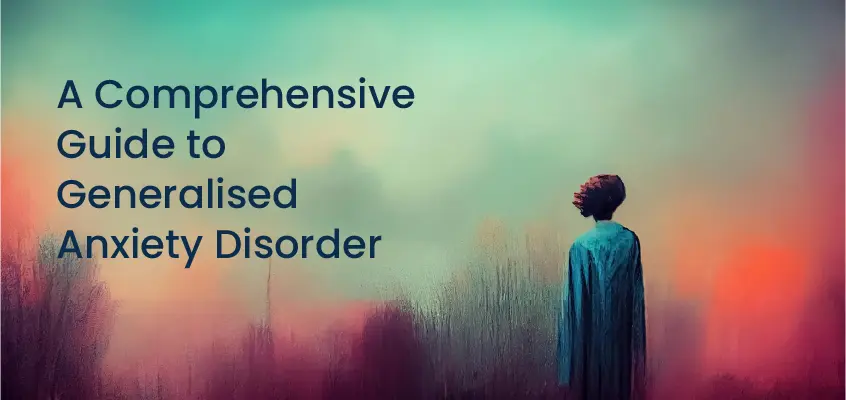Introduction
People feel anxious or apprehensive at various points, which is pretty standard. However, when this anxiety becomes extreme, uncontrolled and persistent and affects people’s daily lives, it may point to the onset of a generalised anxiety disorder (GAD).
Read this comprehensive guide to understand the various aspects of this disorder, including the symptoms, causes and treatment options.
What is generalised anxiety disorder?
Generalised anxiety disorder (GAD) is a mental health condition characterised by constant fear and anxiety in the person. These worries and thought patterns are mostly irrational. People with this condition tend to feel accidents or ailments are waiting to happen to them for no reason. They may feel overly bothered about their finances, family, work, friends and other scenarios. Most importantly, they find it difficult to control their concerns and worries.
Diagnosing generalised anxiety disorder can be tricky. When it comes to anxiety disorders in general, panic attacks are the most common symptom. However, people with generalised anxiety disorder are unlikely to experience panic attacks related to the condition, so they usually assume they are worrying unnecessarily. As a result, the disease either goes untreated or is misdiagnosed.
Thus, according to the fifth edition of the Diagnostic and Statistical Manual of Mental Disorders (DSM-5), evaluating the symptoms is the first step to diagnosing generalised anxiety disorder. Healthcare providers diagnose the condition when the person shows signs regularly for a minimum of six months.
Symptoms of generalised anxiety disorder
The DSM-5 has published criteria to help healthcare providers diagnose and confirm generalised anxiety disorder and decide effective treatment plans. Here is a list of signs and symptoms to identify this mental health condition:
- Evident and excessive worry and anxiety regarding various issues, activities, scenarios and events
- Constant worrying for at least six months
- Uncontrolled fear that may switch between different topics at a time
- Episodes of nervousness and worry with the following cognitive or physical signs (at least three and only one of these indications in adults and children, respectively):
- Fidgeting or being restless
- More tired than usual
- Lack of concentration or blanking out
- Increased muscle soreness or pain
- Sleeplessness
- Feeling twitchy
- Irritability.
While a certain amount of worrying is average, it is advisable to seek professional help when the intensity and frequency of the worrying interfere with daily life. Some people with a generalised anxiety disorder may also develop suicidal thoughts and are likely to need emergency assistance.
Causes of generalised anxiety disorder
People who cannot manage their stress and anxiety will likely develop a generalised anxiety disorder. Although the exact causes of this condition are not yet clear, healthcare providers suggest a combination of environmental, biological and psychological factors are to blame. Let’s look at the possible causes of generalised anxiety disorder:
Environmental factors
- Growing up in hostile environments or experiencing stressful situations
- Having experienced domestic violence, gaslighting, bullying or child abuse
- Being involved in substance abuse
- Having problems with personality development
- Experiencing side effects from certain medications
Biological factors
- Having a family history of inheritable health conditions
- Having a genetic condition
Physiological factors
- Having issues with the areas of the brain involved with controlling anxiety and fear
- Having disparities in brain function and chemistry
- Suffering from painful chronic health conditions such as arthritis, gout and hyperthyroidism.
It must be noted that many people develop generalised anxiety disorder for no apparent reason.
Treatment of generalised anxiety disorder
Generalised anxiety disorder can significantly affect a person’s life socially, professionally and personally. However, healthcare professionals can treat the disease with the proper medications and psychological intervention. Here are the available treatment options for a generalised anxiety disorder:
Psychotherapy
Regarding generalised anxiety disorder, cognitive behavioural therapy (CBT) is one of the best forms of psychotherapy doctors use as treatment. Psychological counselling or talk therapy can also help alleviate the symptoms of worry.
CBT is a short-term therapy that teaches individuals to understand and manage their anxiety and indulge in various activities to keep their worries at bay.
Medications
Here are some medications that healthcare professionals prescribe to treat generalised anxiety disorder:
- Antidepressants: The serotonin and norepinephrine reuptake inhibitor (SNRI) and selective serotonin reuptake inhibitor (SSRI) classes are used for managing generalised anxiety disorder. Some examples include escitalopram, venlafaxine, duloxetine and paroxetine.
- Buspirone: This anti-anxiety medication can help manage the individual’s anxiety levels.
- Benzodiazepines: These are sedatives that help relieve acute anxiety. However, doctors generally only prescribe them on a short-term basis.
Lifestyle changes
Apart from medications and psychotherapy, lifestyle changes can help people manage the symptoms of generalised anxiety disorder and include:
- Limiting alcohol intake
- Practising yoga or meditation
- Regular exercise
- Getting enough sleep
- Quitting smoking
- Limiting caffeine intake
- Eating a healthy diet.
In most cases, medical professionals follow a trial-and-error approach before identifying the most suitable treatment for generalised anxiety disorder. Most people use a combination of lifestyle changes, medication and psychotherapy to manage their symptoms.
Conclusion
Generalised anxiety disorder, like any other anxiety disorder, is treatable using psychotherapy, medications and lifestyle changes. So, there’s no need to suffer in silence. Connect with United We Care, a seamless online mental health platform that provides various online counselling and therapy services led by licenced psychologists and life coaches. Contact us to know more today!
References:
https://www.ncbi.nlm.nih.gov/books/NBK441870/
https://adaa.org/understanding-anxiety/generalised-anxiety-disorder-gad
https://www.nhs.uk/mental-health/conditions/generalised-anxiety-disorder/overview/
https://www.verywellmind.com/dsm-5-criteria-for-generalised-anxiety-disorder-1393147
https://www.hopkinsmedicine.org/health/conditions-and-diseases/generalised-anxiety-disorder












